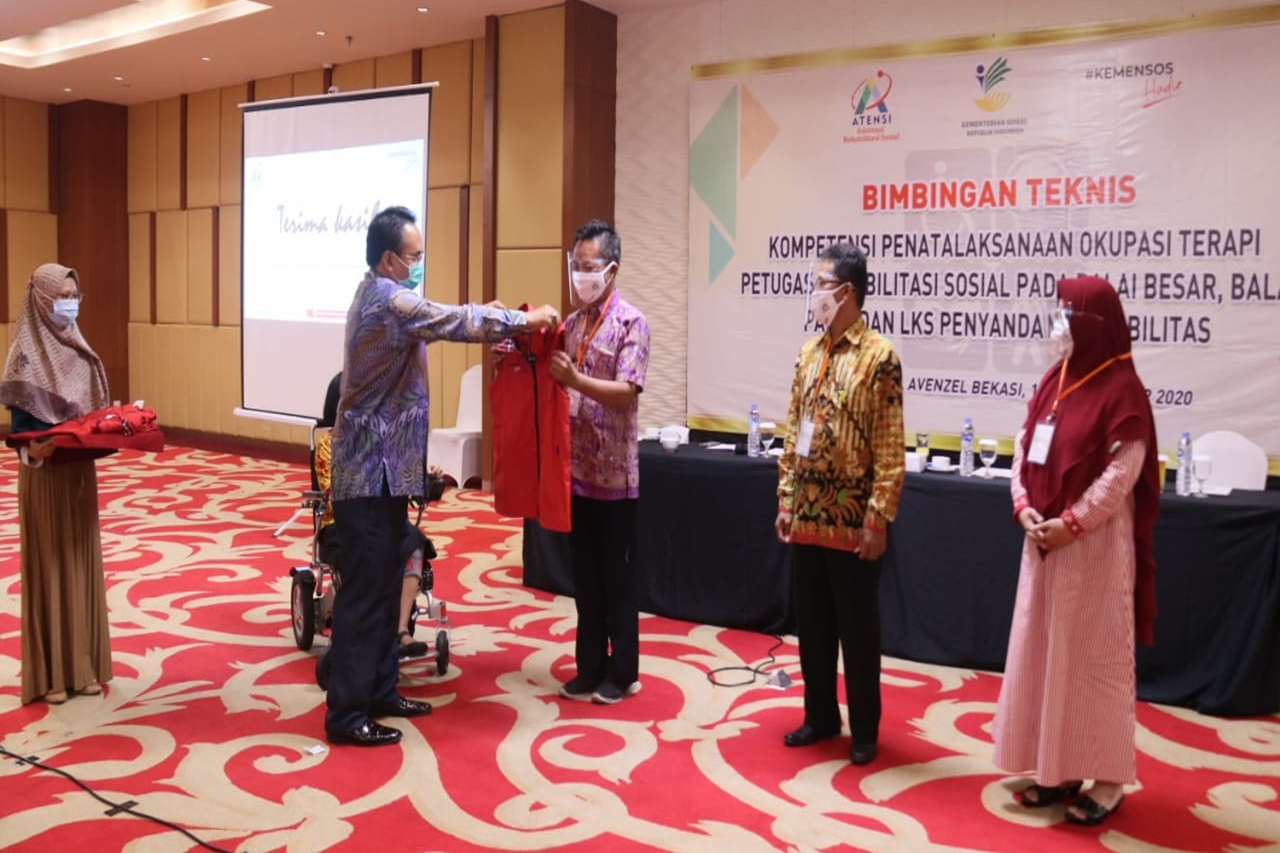Improving Social Services for Disabilities, Ministry of Social Affairs Holds Occupational Therapy Technical Guidance

BEKASI (October 2, 2020) - The Indonesian Ministry of Social Affairs through the Directorate General of Social Rehabilitation continues to improve social services for persons with disabilities through the Social Rehabilitation Assistance (ATENSI) program. One of the important elements in ATENSI intervention is therapy, one of which is occupational therapy.
Director General of Social Rehabilitation, Harry Hikmat delivered his material on Occupational Services in the Social Rehabilitation Assistance Program (ATENSI). This material was presented at the Competency Technical Guidance for Management of Occupational Therapy for Social Rehabilitation Officers at the Center for Social Welfare Institutions (LKS).
This activity, organized by the Directorate of Social Rehabilitation of Persons with Disabilities, aims to improve the competence of social rehabilitation officers in the management of occupational therapy for handling social rehabilitation of persons with disabilities. This activity is also to improve communication skills in direct services to persons with disabilities as beneficiaries.
Social rehabilitation is a form of social services provided to beneficiaries from low-income levels to high income levels. Social services for persons with disabilities must also span from an early age to the elderly. "In the future policy, services must be multifunctional, namely serving all kinds of disabilities from the early age range to the elderly," said Harry.
Persons with disabilities as one of the beneficiaries of social rehabilitation including vulnerable groups, it is necessary to realize that based on the 2018 Susenas data, as many as 30.4 million people with disabilities must be responded to and provided with social services.
Therefore, the ATENSI Program puts forward a family, community (LKS) and the Center based approach to be able to cover a wider range of social services for persons with disabilities.
ATENSI as a direct service program consists of meeting basic needs, physical therapy such as speech therapy, occupational therapy, Activities of Daily Living (ADL), mental spiritual, psychosocial and skills/entrepreneurship, social care and family support.
Occupational therapy is a form of service to individuals with physical, mental and intellectual disabilities who experience impaired occupational performance through meaningful and purposeful activities.
Harry explained that this therapy allows individuals to participate in activities of daily living, productivity and use of free time independently so as to improve the quality of life and create an inclusive society.
Furthermore, Harry explained that there are 7 benefits in occupational therapy, namely self-care, assisting in self-care and developing independence in daily tasks. Then the benefits of productivity, namely developing playing skills, especially exploration activities and developing work skills.
Then the benefits of leisure, namely exploring and developing one's interest in playing, sensorimotor benefits, namely increasing reflexes, muscle strength, flexibility, physical strength, increasing gross motor and fine motor skills.
Then cognitive benefits, namely the ability to concentrate and follow directions, benefits psychological such as increasing self-confidence and the ability to interact in groups. Lastly Benefits environmental, such as making the necessary tools, consultation sessions with parents about community social activities to consultation sessions with schools regarding safe transportation.
In addition to the benefits, Harry also conveyed several methods of occupational therapy that the Center and LKS need to know. These methods are sensory integration therapy, snoezelen therapy, pre-vocational skills, pre-writing skills, self-care therapy, relaxation therapy, ADL therapy, recreational therapy, art group activity therapy, interaction group activity therapy, ADL group activity therapy and problem-solving therapy.
"This occupational therapy needs to be clustered so that there is a common perception between the Center and LKS and can determine the appropriate infrastructure," said Harry.
The Social Rehabilitation within the Ministry of Social Affairs has a role in encouraging the social environment to be more caring and conducting social rehabilitation interventions. So, with this encouragement the range of services will be wider.
The Ministry of Social Affairs must also strengthen cooperation with LKS. It is important to share ideas about occupational therapy and the provision of infrastructure. "Let's provide accessibility for people with disabilities, there must be details and minimum standards must exist," concluded Harry.
Participants in the technical guidance are officers and therapists from the Center for Social Rehabilitation for Persons with Disabilities, Social Rehabilitation Institutions owned by the Regional Government and Social Welfare Institutions (LKS).
 English
English
 Bahasa
Bahasa
